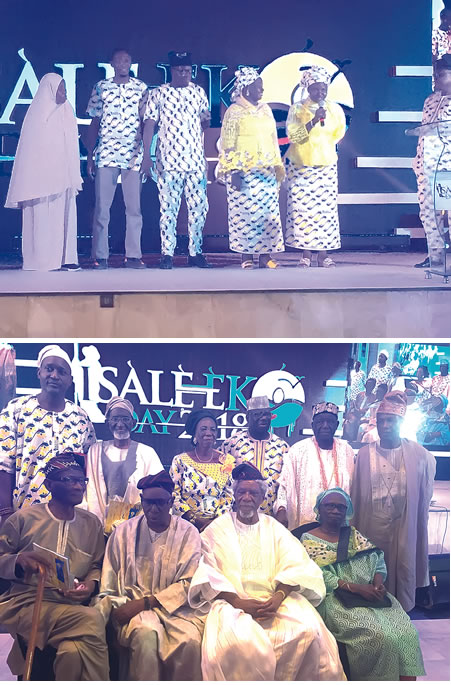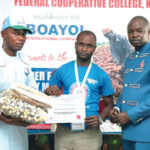The idea to organise the maiden edition of Isale Eko Day by the aboriginal inhabitants of the city recently was seen as a way of rekindling such history in the consciousness of the public. Though Lagos is seen as no man’s land, the people of Isale Eko went into the archives at the maiden edition of their day to bring out their rich historical heritage and let it be known that there are people who are aborigines in Lagos
The event, held at the City Hall, on Lagos Island, according to the organisers, was meant to promote oneness, cohesion and integration among the indigenes. The social event was graced by virtually all the prominent Isale Eko indigenes including their younger generations, displaying their culture in terms of food, drinks and music.
In attendance were the Oba of Lagos, Oba Riliwan Akiolu 1, who was represented by his wives, a Senior Advocate of Nigeria (SAN), Mr. Femi Okunnu; an engineer, Mr Layi Ajayi Bembe; members Of The Isale Eko Descendants Union, among others.
While addressing the indigenes, a prominent Isale Eko indigene, Mr Femi Okunnu, said that the reason for the Day was to promote the spirit of oneness and cooperation among the younger generation of Isale Eko indigenes, intimating them of its cultural values and the need to participate in the politics of the state.
“Isale Eko Day is to bring the sons and daughters of Isale Eko together. It is a re-union. First of all, to know what is Isale Eko. Most of the children don’t know where Isale Eko is. So, they are all here to rejoice among themselves. As you can see, people are watching the culture of Isale Eko. Lagos is the heart of Nigeria and if the heart goes, what is left?” the legal luminary stated.
“We are not involved in the political sector of Lagos. We are using this celebration to remind ourselves to be part and parcel of Lagos politics, the way our fathers were then. My advice to Lagos indigenes is to become politically aware and join whichever party they want to join, whichever party they believe in its philosophy and programme.
“We are not saying join this party or that party. We are not saying this is good and that is bad. We are saying get out and express yourselves; get out and be part of politics in Nigeria. That is the only way we can impact the society positively,” Okunnu said.
Speaking on the historical importance of the community, the legal luminary said Isale Eko started as a small fishing territory, populated by the Aworis and the land-owner families, the white cap chiefs, called Idejos.
“Oniru, for example, owns the present Victoria Island, which was compulsorily acquired by the colonial government in the 50s and they paid them compensation.
“Before then, Apapa was acquired by the colonial government almost 90 years ago and the Oluwas were given compensation. Now, there are other parts of Lagos owned by the Idejos. They were the first settlers there and thereafter other people came to settle in Lagos,” he narrated.
He explained that Lagos is a blend of different ethnic groups-the Idejos and the Benin people, adding that “In fact, the Benin people gave Lagos its Oba. Before then, the Nupes, Tapas also settled in Lagos. I have Nupe blood in me, as I speak to you here.
“We also have the Ijebus, the Egbas, the Oyos, the Ekitis, settling here. The returned slaves also came to settle in Lagos — the Saros, The Brazilians. So, Lagos is composed of varieties of people in the country,” he stated.
He explained further that: “the Isale Eko is largely of Benin origin — Idu Ishagbe, Idumota, Idumagbo and Idu Itafa. Idu in Benin means area. That shows the Benin influence here. That is why we say all the Obas in Lagos have Benin blood.”
Okunnu emphasized on Eyo as central to the people of Isale Eko, adding that his great grandfather was the head of Eyo Alakete Pupa, adding that the concept of Eyo was built around friendship and love.
Playing up the role of Lagos as the heart of Nigeria, Okunnu said that that Lagos used to be the heartbeat of the nation’s politics, until the early 50s; since all Nigerian politicians lived in Lagos, then.
“Lagos haboured people like Nnamdi Azikiwe of Igbo origin, who later became the first elected member of the Legislative Council in 1946 under the Richards Constitution. So, Lagos was the centre of Nigerian politics,” he said.
Another prominent Isale Eko indigene, Layi Bembe, charged Isale Eko indigenes to take what belongs to them politically. “We are not stopping any Isale Eko indigene from being a politician. The fact is that politics is a very tough game. You could be in power today. If you don’t use it well, somebody else will come and take it over from you. To me, I won’t stop any indigene from delving into politics as long as he realises that he is there to serve his people and not his pocket,” he stated.
He lamented the situation where indigenes of the state are being marginalised by non-indigenes, with political power. “Those who think they are marginalising Lagos and its indigenes are only digging their graves, because people can see what they are doing. People knew who they were the first time they came to Lagos, how they were accepted and how they are now betraying the indigenes of Lagos.
“They are going to pay for it if not in our generation but in the generations to come. After all, we didn’t bring anything to this world, and we are not taking anything back. If they like, they should acquire the whole of Lagos. One day, they will leave it and the truth will come out,” Layi Bembe stated.
He explained that Lagos is the first in the southern part of Nigeria, noting that Lagos was a colony of Britain until Richards Constitution was drawn. Also giving a brief history of the people of Isale Eko, he said that Isale Eko is principally occupied by the Aworis and the Benins, hence the Benin dialect’s influence on some communities’ names, such as: Idu Shogbon, Idu Shagbe and others, in Lagos.
Speaking also, the General Secretary, Isale Eko Descendants Union, Dr. Noah Lawal Junaid, said the union had awarded scholarships to 125 beneficiaries from 1979 till date across state’s secondary and tertiary schools.
The union, which was originally known as Isale Eko Scholarship Fund Committee, was established after the appointment of Professor Teslim Olawale Elias as the Chief Justice of Nigeria in 1972.
The General Secretary said that the main objective of the union was to award academic bursaries and scholarships to indigent sons and daughters of Isale Eko who desired further education.
He added that the union also promotes quality healthcare through funding and management of clinics within the locality.
Dr Junaid explained that the association purchases, leases and acquires land, buildings or tenements in the name of the group to fund some of the its projects.
Junaid stated that the union was an apolitical, charitable and sociocultural association, with the vision to make Isale Eko descendants a united, highly-educated, resourceful, well-informed, wealthy and prosperous people.







